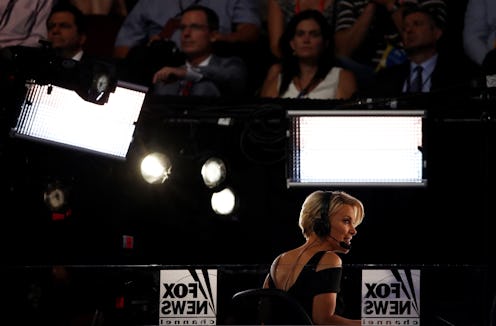On Tuesday, Megyn Kelly and Ivanka Trump had a conversation about paid maternal leave and childcare. It wasn't particularly unusual in the context of the presidential election; after all, Trump has played a significant role in shaping her father's policies on these issues, which he unveiled earlier in the day. However, it was interesting to see Kelly and Trump discuss something often labeled as "liberal" — something that Democratic nominee Hillary Clinton has made the cornerstone of her campaign and career. Trump pointed out that Democrats don't "own" issues like paid family leave, but her conversation with Kelly was interesting because it makes us think about how we talk about conservative feminism.
As someone who is both far-left and passionately feminist, I had to pause for a moment when I listened to Trump and Kelly's conversation because I was confused. It seemed to me that Trump had taken liberal rhetoric and simply stamped her father's name across it to make it part of his campaign. But women do not have to be liberal to care about feminist issues, and to ignore Trump's policy proposals in light of her political leanings would not be constructive. It is not acceptable for me or for anyone else to take away her agency, or try to fit her into boxes of my own creation.
Trump's father has made both sexist and racially-charged comments, and it doesn't come as much of a surprise at this point. In all likelihood, Trump will not be able to sway all that many women to vote for her father if they've been paying attention to some of the remarks he has made about women. The Republican nominee may be integrating these new policies into his platform to improve his standing among female voters — which probably won't work — but that's not Trump's reason for proposing them. No, she actually cares about these issues, and she doesn't have to strictly identify as a liberal to do so.
I won't deny that Trump's portrayal of her father's campaign confuses and even appalls me. The Donald doesn't strike me as someone who cares about women enough to not make obscene references to "blood coming out of her wherever." He doesn't strike me as someone who could connect with female voters of his own accord. I highly doubt he would even be talking about paid maternal leave if his eldest daughter had not urged him to do so. But Trump and Kelly's conversation is more than just a tangent to the Republican platform. It's a sign that right-wing feminism should not be overlooked.
It's worth pointing out here that neither Kelly nor Trump actually identifies as conservative. Kelly told Variety last year that she identifies as an independent, and has previously voted for both Democrats and Republicans. She also put forward the idea that as a reporter, she's not rooting for anyone, and she's never gone easy on Republicans she has interviewed just because she works for Fox News. After this election cycle, that has become even more clear. Trump, meanwhile, said at the Republican National Convention that she doesn't identify as a Democrat or Republican, either. To call them conservative is also placing them in pre-created boxes filled with assumptions and a refusal to acknowledge nuance.
So why start out by calling Kelly and Trump's conversation an example of "conservative feminism"? Because it proves the point — we often see what we want to see, and when people don't fit neatly between the lines we have in mind, we don't leave any space for them on the imaginary political grids we construct. Kelly works for Fox News, so I and many other people have often wondered if it was possible for her to be anything but conservative. Trump has never come off as particularly conservative, but her work on her father's campaign has overshadowed her work as a businesswoman and a mother.
Both women have said things that have angered me as a feminist, but that doesn't mean they're not allowed to care about issues I perceive as feminist. These are all things that are hard for me to say; Kelly and Trump don't particularly strike me as intersectional feminists, but they are also speaking to large conservative audiences about issues that we assume only liberals ever discuss.
It's important that they have the conservative platforms they do — while Trump's father thankfully has no chance of redemption whatsoever, she and Kelly are still able to talk about things like maternity leave, childcare, and working women in predominantly right-wing spaces. Chelsea Clinton understandably questioned Trump about painting her father's campaign in an apparently inaccurate light, but Trump is obviously not her father, and Kelly is not the entire Fox News' viewer base.
To make assumptions about Kelly and Trump's views on feminism based on anything other than what they've actually said would not be fair to them, or to other feminists. While I have never received the impression that Kelly and Trump are fighting for women of color like myself, I still think it's important to acknowledge and listen to the nuance they presented in their conversation.
